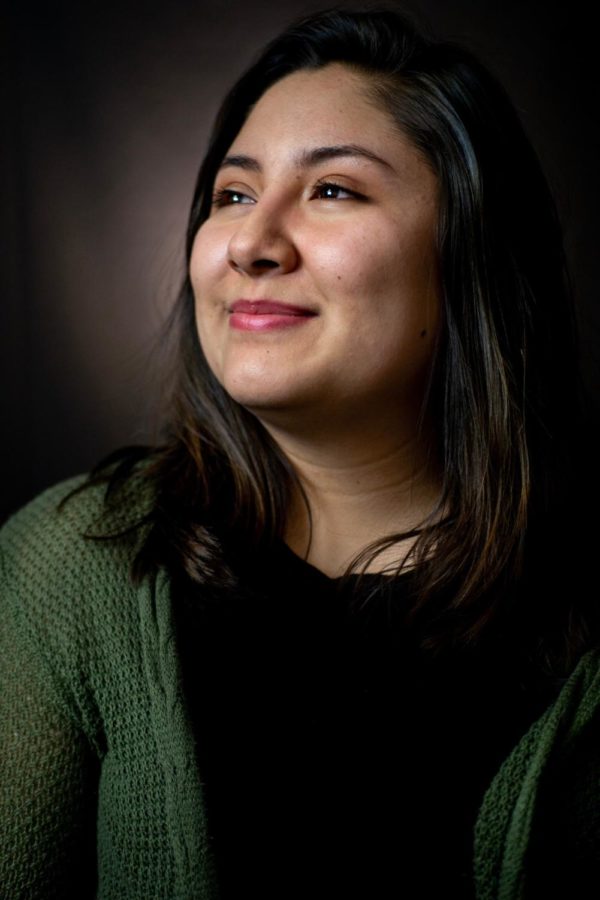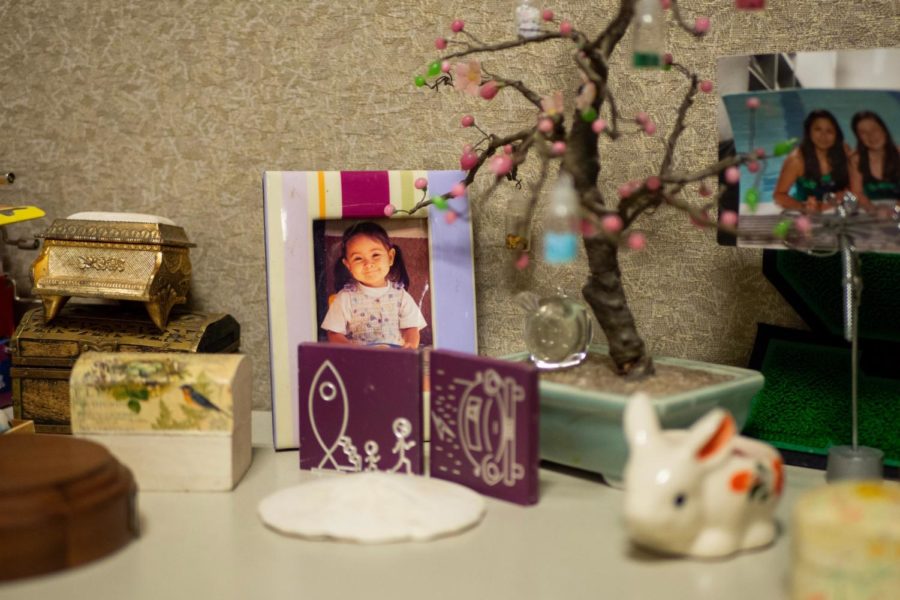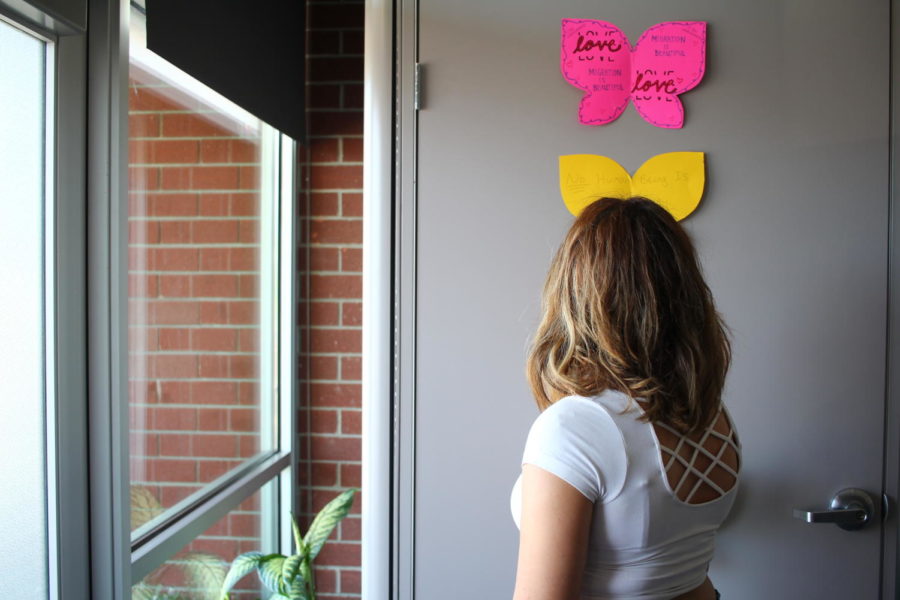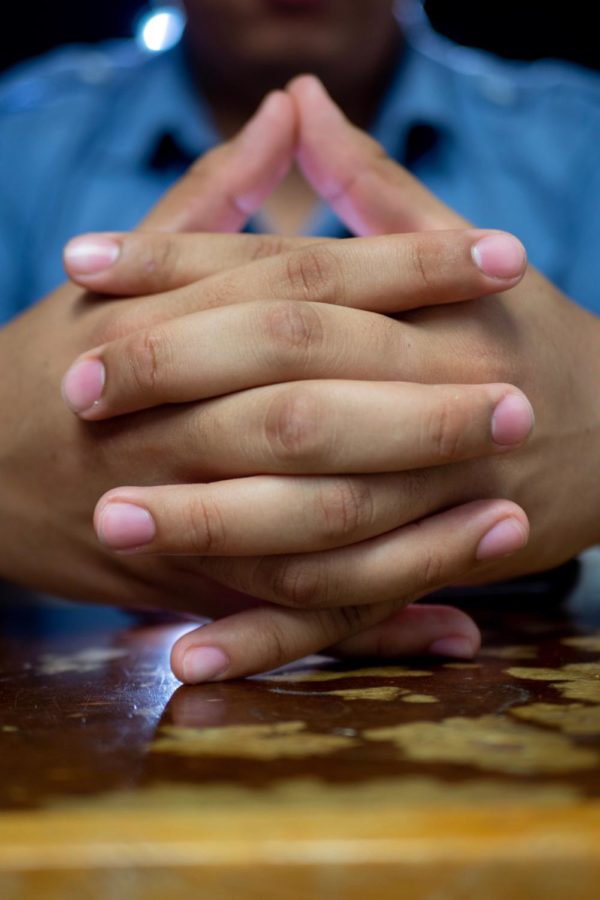This is my home: Three SRJC students share what it means to be undocumented
May 14, 2019
SRJC nursing student Jocelyn Zhaori Contreras-Toscano is vice chair of Student Life and co-chair of Movimiento Estudiantil Chicanista de Aztlán (MEChA). She flew into the U.S. at age 2 on the lap of a stranger and talked with the Oak Leaf about the difficulties of being undocumented.
A fractured identity. Unable to travel freely. Feeling unwelcome in the place they’ve made home. Such are the circumstances for millions of undocumented immigrants who came to the U.S. in search of a better life — and for three Santa Rosa Junior College students who immigrated from Mexico as toddlers.
Despite growing up in California, attending the state’s schools and being immersed in its culture for two athree students feel caught between two worlds. They don’t feel entirely American, but they don’t fully relate to being Mexican, either.
For these three — Jocelyn Zhaori Contreras-Toscano, Bibiana “Bibi” and “Aaron” — their identities are as unclear as their immigration status.
Two of the three students weren’t aware of their undocumented status until high school; the third knew he was “illegal” from childhood. But in 2012, during their freshman year of high school, Deferred Action for Childhood Arrivals (DACA) gave each of them a temporary social security number in order to work, drive and go to school legally.
The program began during President Barack Obama’s second term to give stability to children whose parents brought them to the U.S. without documentation. And while it provided opportunity for all three of these students to continue their education or travel back to Mexico, DACA did not help them feel more welcome in America. In fact, since President Donald Trump’s election in 2016, the opposite is true for them.
All three hear the president’s rhetoric categorizing Mexicans as undesirable future citizens. All three see the hate-filled posts that pack social media feeds. And all three have leaned on SRJC to navigate all aspects of their situation, from this lack of acceptance to the requirements of immigration paperwork.
Through their education and hard work, these students hope to give back to their communities and contribute to American society — a society that doesn’t always embrace them — even if they never become U.S. citizens themselves.
These are their stories.
Jocelyn
Jocelyn Zhaori Contreras-Toscano was born in Guadalajara, Jalisco, Mexico to a stay-at-home mother and metal shop worker father. Before she turned 2, Contreras-Toscano was flown to California on the lap of a stranger before being reunited with her parents who traveled separately to the U.S.
Her parents hoped immigrating would allow her to “have a better life,” and in many ways it has. Contreras-Toscano, 19, graduated from Sonoma Valley High School and attends SRJC as a nursing major with plans to become a nurse.
But she isn’t content with her identity.
“I don’t consider myself American, but I’ve lived here my whole life,” she said. “It’s basically the culture I grew up in.”
Contreras-Toscano considers herself Mexican because she was born in Mexico, but that’s where her Mexican-ness ends. She did not have a quinceañera, and her family rarely goes to church — both considered hallmarks of Mexican culture and family life.
Her family is divided between the U.S. and Mexico. Her grandmother has visited this country several times, but Contreras-Toscano has only been back to her native country once since arriving as a toddler. Her murky immigration status prevented her from visiting; she was concerned that if she left the states, she would be prohibited from returning.
Her single trip back to her birth country happened in 2016 when she returned to visit her dying grandmother. She felt comfortable traveling because she was awarded a permit through advance parole, a program allowing non-U.S. nationals without immigrant visas to re-enter the country after traveling abroad.
Contreras-Toscano’s trip to Mexico was a revelation.
“I am more Americanized than I am Mexican,” she said.
The locals treated her like an outsider, like a visitor. Her Spanish accent was notably different than theirs, and she felt she didn’t belong.
“The best way to describe [the trip] was very surreal,” she said. “I was caught between two worlds.”
The JC has been integral in helping her find her place. She joined Movimiento Estudiantil Chicanista de Aztlán (MEChA), Mujeres Chingonas, Feminists United, the Puentes learning community and the Undocumented Students Union (USU).
“I have chosen to surround myself with people who are supportive of undocumented students, people from other cultures and people of color. That’s why I feel [SRJC] is such a safe place,” Contreras-Toscano said. “I chose to do these things and make myself more vulnerable for the people who are too scared to.”
She believes navigating the path to citizenship is largely a waiting game, whether it’s waiting for approval within the existing immigration system or waiting for the laws to change.
Like other undocumented people, Contreras-Toscano could apply for a green card formally recognizing her U.S. residency; both her 16-year-old sister and 8-year-old brother were born in the U.S. and could sponsor her application when they turn 21. But the process is long and arduous. According to Contreras-Toscano, it could take anywhere from 10 to 30 years for a green card application to be approved.
So rather than focusing all her effort on gaining citizenship, Contreras-Toscano continues advocating for minority groups through social activism, volunteerism and mentoring, and making the most of her blended Mexican-American life.
“I am grateful that my parents brought me here.”
Bibi
SRJC student Bibiana is a student success team member and psychology major who came to the U.S. at 2 years old. Now a 20-year-old with plans to pursue a psychology degree, “Bibi” wants to become a marriage and family therapist — and a U.S citizen.
She grew up considering herself Mexican. She didn’t worry about her place in the world or what her identity would mean to her future.
“My parents brought Mexico to me: the food, the language and the music,” she said. They encouraged her to hold onto her heritage, which became harder to do as she got older.
“In middle school we were all friends: everyone mixed. There was no racism. Everyone just blended together,” she said.
But when Bibi reached high school, everything changed. Listening to traditional Mexican music made her a target for bullying, even among her Mexican classmates.
“I like what I know from my culture, but I’m also part of the U.S.,” Bibi said.
It bothers her that people think undocumented immigrants should return to Mexico, particularly when so many have spent almost their entire lives living in the United States and contributing to American society.
Bibi’s parents also want her to contribute and succeed; her goal is to work with foster children and provide therapy for adolescent Latinos. She hopes her successes will show that negative connotations about Mexicans are wrong.
Her motivation to succeed: President Donald Trump.
“Sometimes I want to give up, but then I remember that Trump said [undocumented Mexicans] are ‘criminals’ and that we’re ‘rapists,’’’ she said. “And I’m like, no we’re not. Let me prove to you and show you that I’m here to graduate.”
To help support her on campus, Bibi relies on multiple campus groups including Extended Opportunity Programs and Services (EOPS), MEChA and the Dream Center (DC).
The DC offers undocumented students access to lawyers, advice for DACA renewal and help with scholarships. DC staff also provide information about the California Dream Act allowing undocumented students to get financial aid from the state.
“Getting involved made me feel a lot safer and a lot more comfortable here as an undocumented student,” she said.
Many immigrants feel unsafe in America, particularly since President Trump took office and tightened immigration policy. Although the laws for traveling to and from Mexico have not changed, many undocumented immigrants are hesitant to leave the U.S. for fear U.S. Customs and Border Protection will deny them re-entry.
Bibi herself struggled with this. In 2017, she planned to travel to Mexico to visit her grandmother and uncle, but her lawyer advised her to remain in the U.S. She reluctantly canceled her trip and never got to see them before they died within one month of each other.
The occasional phone call or video is the only contact she has with her relatives.
She wishes it wasn’t this way.
Bibi wants Earth to be freer, a place where people can easily cross from one country to another. From her perspective, a country’s borders are based on nothing more than history; California used to belong to Mexico and before that to the Native Americans. She wishes governments recognized the arbitrary nature of their country’s borders and relaxed the laws for crossing them.
If that were the case, Bibi might find answers to some of the tough questions that have followed her since she arrived in the U.S. 18 years ago.
“Where do I belong? Where am I from?” Bibi asked. “This is my home. What do you mean ‘go home’?”
“Aaron”
An SRJC engineering major who wishes to remain anonymous, “Aaron” is an undocumented immigrant who was brought to the U.S. when he was 1 year old. He lived with his two parents and two younger siblings in Cotati for his first four years in the U.S.; now he and his family live in Petaluma.
Growing up, Aaron was anxious about his undocumented status, a familiar feeling for many immigrants.
“Out there in society, there really is a curtain that you can’t tell people you’re undocumented because of embarrassment and fear,” he said.
While attending Casa Grande High School, he was accepted into the DACA program, which relieved some of his fear of being identified and deported and allowed Aaron to work and go to school legally.
“I really believe that DACA is going to change something and help me,” Aaron said.
He also looks to SRJC for support. Its English as a second language classes, EOPS programs and clubs, including MEChA, are a vital part of the community the college provides for undocumented students.
“I feel safe at the JC,” Aaron said. “I don’t feel discriminated for being undocumented.”
But off-campus is a different story. Last spring, Aaron boarded his first flight for a spring break trip with friends. While passing through the Transportation Security Administration (TSA) checkpoint, Aaron was stopped
for an extended period of time because his documentation differed from an American citizen’s.
Aaron knew his DACA status allowed him to travel legally within the U.S., but he couldn’t shake the feeling something bad was going to happen.
“I was super scared when I went through TSA,” he said. “Even though I was OK to travel, I still had that fear of being deported.”
He looks forward to the day he can travel outside the U.S., too, without fear of being denied reentry. This would require Aaron attain formal U.S. residency, a status that might also help him sort out his identity.
“I live in two worlds,” Aaron said. “In the American world, I am not welcome. I don’t have freedom, and I’m somewhat like a prisoner.” But he doesn’t feel welcome in the Mexican world either, and, even worse, he feels his Mexican heritage has made it harder to fully assimilate into American culture.
His identity struggles aren’t limited to his nationality or ethnicity. He feels he is breaking the law just for living in a place that’s been his home his whole life.
“I just want the freedom to not be a criminal, because I just realized undocumented means criminal,” Aaron said. “I don’t want to be a criminal.”
For now, he finds peace attending the JC and knowing he lives in one of the most accepting states in the country.
“I accept being Californian, and I’m happy with it,” he said. “I’m happy that I don’t identify as American or Mexican.”




Betsy Tirado • May 20, 2019 at 2:03 pm
Aaron et al
I was born “ an American “ I was born in Puerto Rico and raised in NYC
After more than 5 decades in NY,
I am, will be and die Puerto Rican
I have never considered myself “American”
I’ m proud of its culture, traditions , language its food
My parents made sure that I kept close ties with our family, community
Our doors always open to Welcome them and thus making the bonds stronger.
I know is a different situation for you but ask my children born and raised in NYC and they always answer I’m Puerto Rican..
You guys are doing great, hold your head high, be proud of your incredible culture.
Show them that you can , you will , you will persevere and stand strong
Tu descendencia Azteca es pura y fuerte!!!
Y eres también Norte Americano, ya que México queda en Norte America!!!!
Maria • May 16, 2019 at 7:46 pm
Hang in there. Things change and get better. I came to the states when I was 17 and also attended the JC. I met my husband, got married and became a citizen 14 years ago. I remember thinking that no matter what happened, I was going to learn, and never stop learning because regardless of where life could take me I was going to take the knowledge with me.